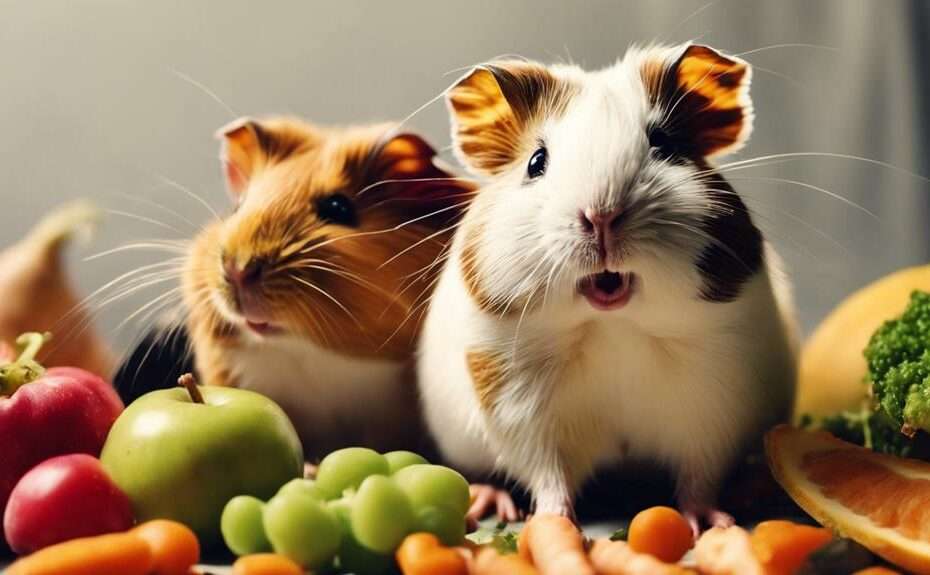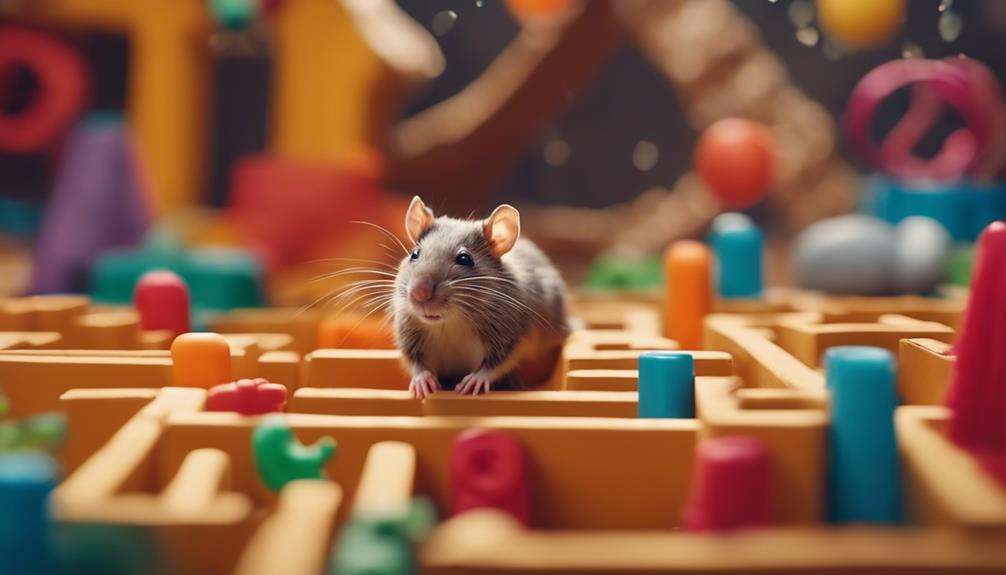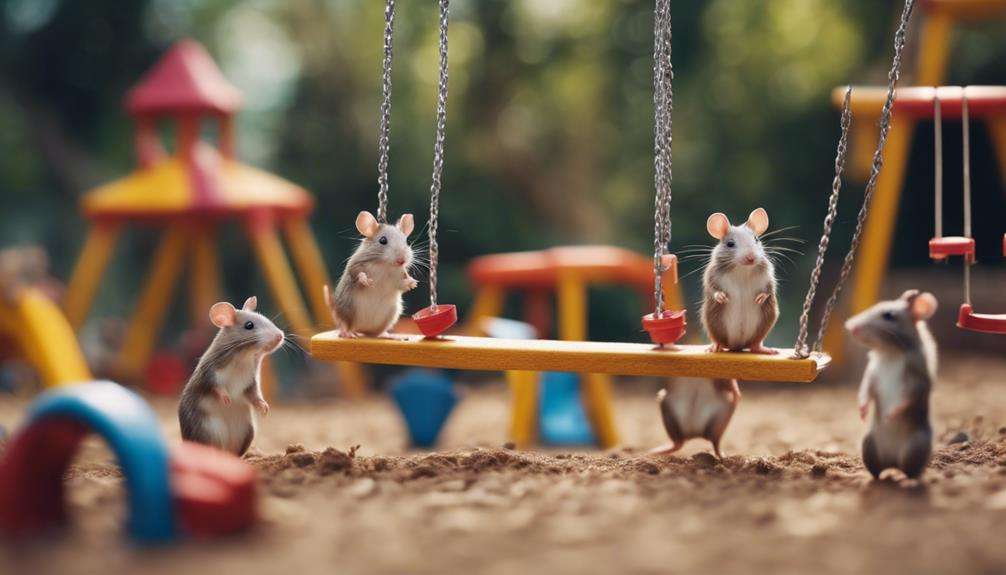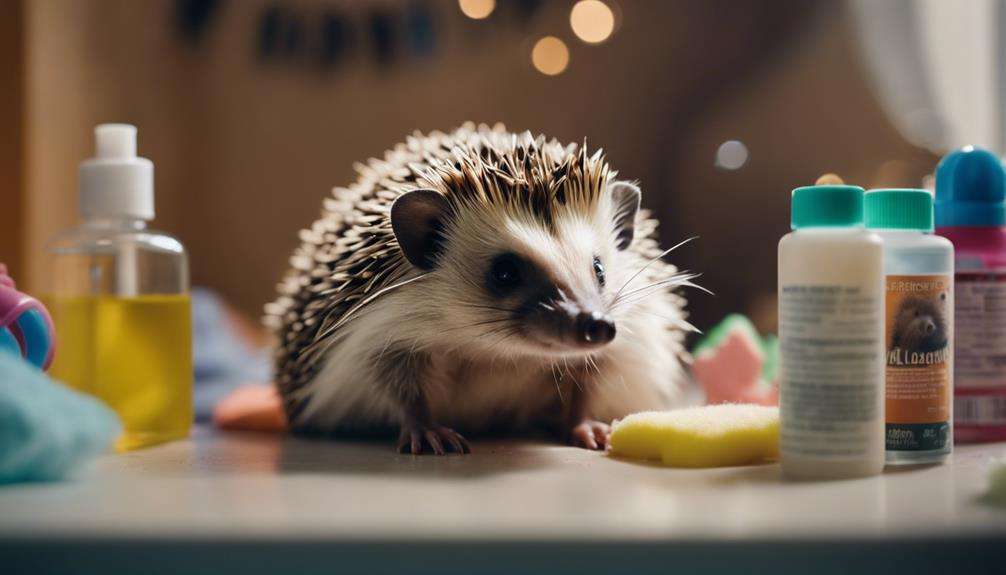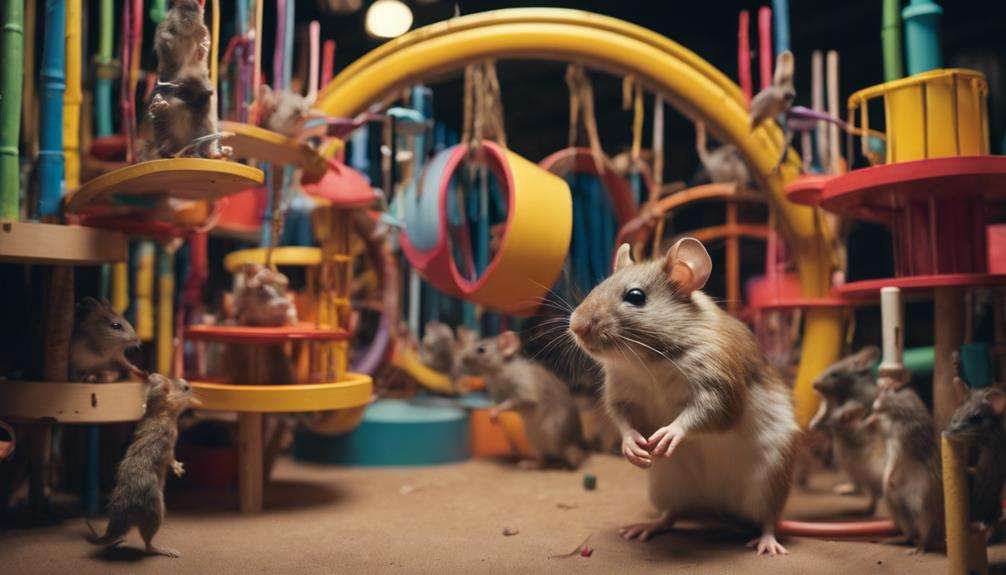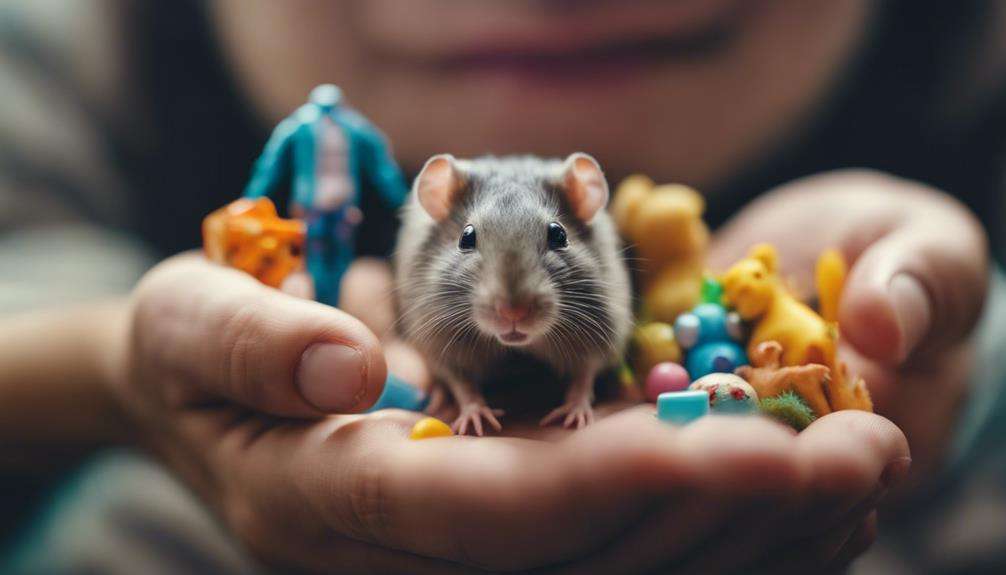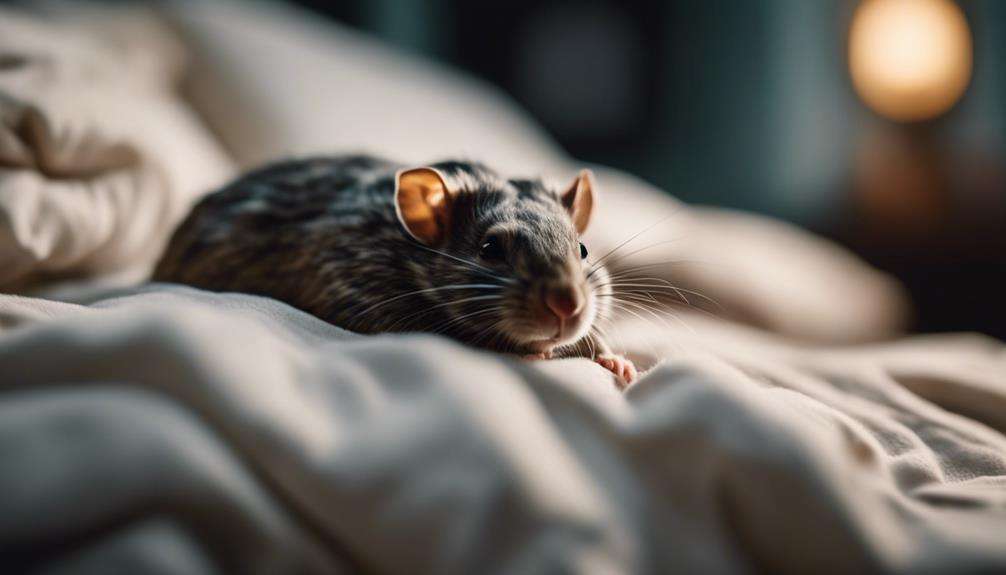When it comes to your quirky rodent companions, their diet is as vital as the wheels they run on. Experts in the field have unveiled some surprising insights that could redefine the way you view those tiny food preferences.
From the intricate balance of nutrients to the potential pitfalls lurking in seemingly harmless treats, understanding the nuances of their diet can be the key to unlocking a healthier, happier life for your beloved rodents.
So, let's explore the intriguing world of quirky rodents and the expert advice that could make all the difference in their well-being.
Key Takeaways
- Rodents like degus, chinchillas, and guinea pigs have specific dietary needs for optimal health.
- High-fiber diets are crucial for digestive health and overall well-being in rodents.
- Protein intake (14-16%) supports muscle development, while fat content should be under 8% for energy needs.
- Meeting nutritional requirements is essential to ensure the best health outcomes for pet rodents.
Nutritional Needs of Quirky Rodents
Quirky rodents, such as degus, chinchillas, and guinea pigs, have distinct dietary requirements essential for their optimal health and longevity. Providing the right nutrition is crucial for these small pets. When it comes to Pet Rats, a balanced diet is key. They should be fed a high-quality rat food that provides essential nutrients. Water bottles are essential for keeping rats hydrated and should be cleaned regularly.
For degus, dietary fiber is a crucial component of their diet. They require a high-fiber diet to support their digestive health. Sugary and fatty foods should be limited to prevent obesity and other health issues. When it comes to chinchillas, their diet should be rich in dietary fiber and low in fat. Avoid feeding them sugary fruits and vegetables as these can lead to digestive problems.
Guinea pigs benefit from a diet high in Vitamin C. They should have access to fresh hay, vegetables, and a limited amount of fruits to ensure they receive all the necessary nutrients for their well-being. Understanding the specific dietary needs of these quirky rodents is essential for keeping them healthy and happy.
Importance of Fiber in Rodent Diets
Fiber plays a crucial role in the diets of rodents, supporting their digestive health and overall well-being through its diverse benefits.
Soluble fiber, found in rodent diets, aids in colon health and stool quality by attracting water to form a gel. On the other hand, insoluble fiber supports gut motility and overall gut health in rodents. Research even suggests that insoluble fiber can improve insulin sensitivity and weight control in these animals.
Combining both types of fiber in rodent diets is particularly beneficial for their digestive health. This mix promotes satiety, aids in maintaining healthy gut motility, and contributes to overall health.
Ensuring that your quirky rodents have access to a balanced diet rich in both soluble and insoluble fiber can significantly impact their well-being and longevity. Remember, a healthy gut means a healthier and happier rodent companion.
Protein and Fat Requirements for Rodents
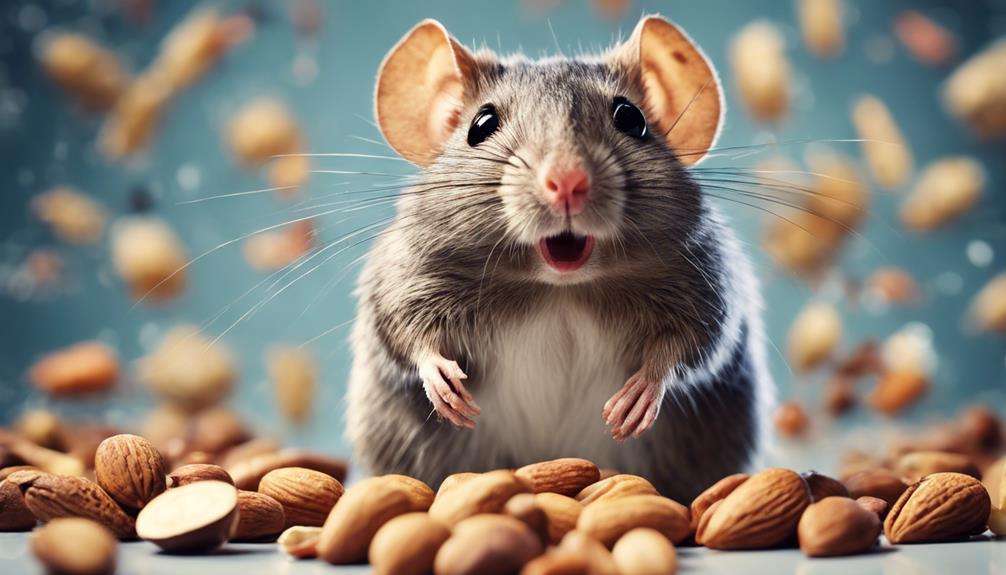
Rodents have specific protein and fat requirements crucial for their optimal health. Ensuring a diet with 14-16% protein aids in muscle development, while keeping fat intake under 8% supports energy needs and weight maintenance.
Balancing these essential nutrients with sources like lean meats and quality rodent blocks is key to meeting rodents' dietary needs effectively.
Nutritional Needs Overview
To ensure optimal growth and maintenance for rats, it's crucial to provide a diet containing 14-16% protein and keeping fat levels under 8%. Protein plays a vital role in muscle development and repair, while balanced fat intake is essential for energy production and hormone regulation in rodents. Meeting these nutritional requirements is key for the overall health and well-being of rats.
Importance of Balanced Diet
For optimal health and well-being, it's essential to ensure that the diet of pet rats contains a precise balance of protein and fat within specific ranges. Pet rats require a balanced diet with 14-16% protein and fat content under 8% to thrive.
Protein plays a critical role in growth and repair processes, aiding in muscle development and supporting immune function in rodents. On the other hand, fat provides essential energy and supports vital functions in their bodies.
Maintaining the correct levels of protein and fat is paramount for the overall well-being and longevity of pet rats. Proper protein intake is crucial for their growth and immune system, while balancing fat intake helps prevent obesity and maintains a healthy body condition.
Enrichment Ideas for Rodents
Regularly incorporating a variety of toys, tunnels, and climbing structures in your rodent's environment can significantly enhance their physical activity and mental stimulation.
Rotating bedding materials such as shredded paper, hay, or cardboard not only keeps their living space fresh but also provides sensory enrichment.
Foraging opportunities, like hiding fresh fruit in toys or scatter feeding, tap into their natural instincts and keep them mentally engaged.
Introducing new textures and materials such as cardboard tubes, wooden chews, or fleece blankets can offer additional sensory stimulation for your curious rodent.
Social interaction with compatible cage mates or supervised playtime outside the cage is crucial for their mental well-being and helps prevent boredom.
Safe and Unsafe Foods for Rodents
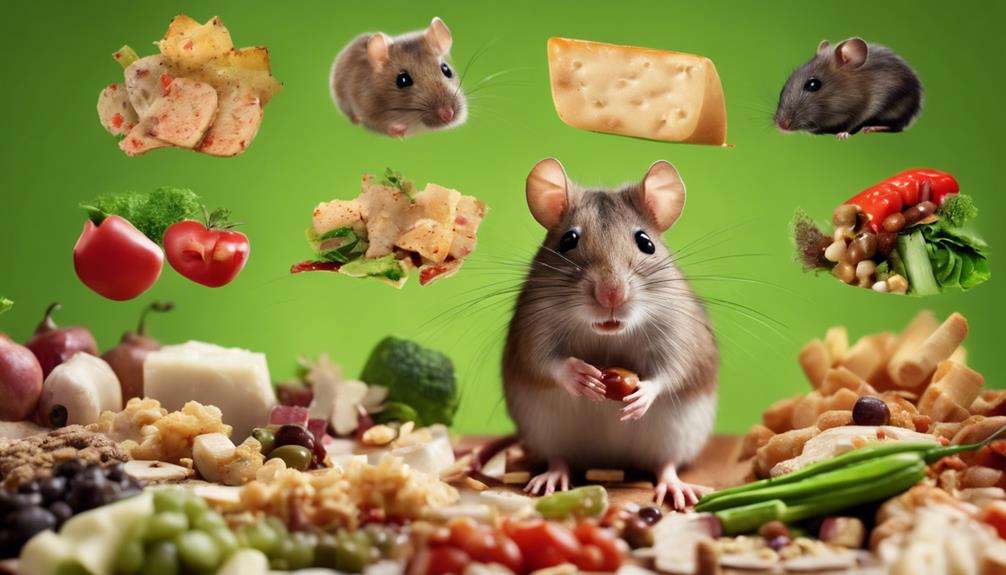
Safe and Unsafe Foods for Rodents encompass a range of dietary options that can significantly impact your furry friend's health and well-being. When considering what to feed your rodent companion, it's crucial to be aware of the following key points:
- Fresh Vegetables: Provide a variety of fresh vegetables such as carrots, bell peppers, and leafy greens to ensure your rodent receives essential vitamins and minerals.
- Lean Proteins: Opt for lean proteins like cooked chicken to support your rodent's muscle maintenance and overall health without adding unnecessary fats.
- Toxic Foods: Avoid feeding your rodent toxic foods like avocado, onions, garlic, and citrus fruits as these can lead to severe health issues and even be fatal.
Remember that while nuts and seeds can be given as treats, they shouldn't make up a significant portion of your rodent's diet due to their high-fat content. Researching specific safe and unsafe foods for your rodent's species is vital to providing a balanced and healthy diet.
Snacks and Treats for Rodents
When selecting snacks and treats for your rodent, prioritize options that are low in sugar, fat, and protein to maintain a balanced diet and prevent health issues. Rats enjoy fresh vegetables, fruits, and low-calorie commercially available treats, which can enrich their lives.
Treats should only make up 10% of a rat's diet to avoid problems like obesity. It's crucial to steer clear of high-sugar, high-fat, or high-protein treats that could lead to nutritional imbalances in rodents. Fresh treats must be thoroughly washed to eliminate any pesticides or contaminants before being offered to your furry friends.
If opting for commercially available treats designed for rats, ensure to give them in the recommended portions to uphold a well-rounded diet. By being mindful of the treats you provide and sticking to the recommended portions, you can contribute to your rodent's overall health and happiness.
Signs of Dietary Issues in Rodents
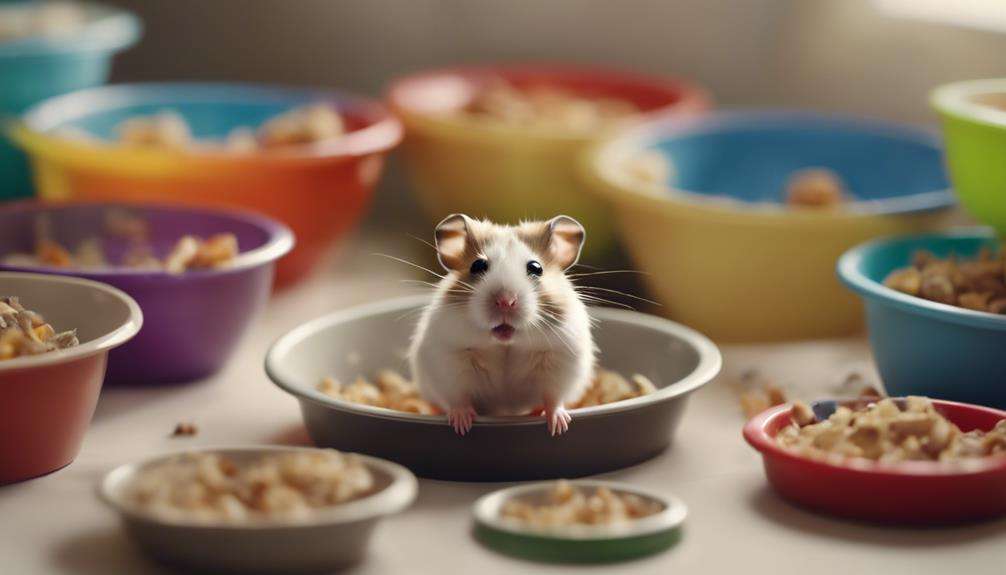
To detect potential dietary issues in rodents, observe closely for signs such as weight fluctuations, changes in fur quality, altered activity levels, and behavioral shifts like increased aggression or lethargy.
Signs of Dietary Issues in Rodents:
- Weight Loss or Gain: Sudden changes in weight could indicate an imbalance in your rodent's diet. Significant weight loss or gain without a known cause may signal underlying nutritional deficiencies or excesses.
- Changes in Fur Quality: A glossy and smooth coat is a sign of good health in rodents. If you notice dull, rough, or patchy fur, it could be a red flag for inadequate nutrition.
- Behavioral Changes: Keep an eye out for alterations in your rodent's behavior, such as increased aggression, excessive lethargy, or unusual repetitive actions. These changes may be linked to dietary issues affecting their overall well-being.
Unique Feeding Considerations for Rodents
For optimal health and nutrition, it's crucial to consider the specific dietary requirements of different rodent species. Guinea pigs and chinchillas, for example, have specific dietary needs that include high fiber and vitamin C requirements to thrive. Gerbils, on the other hand, require a diet high in protein and fat, with minimal fresh fruits and vegetables.
Hamsters, being omnivores, benefit from a diet rich in grains, seeds, nuts, and even insects. Degus, known for their susceptibility to health issues like diabetes and obesity, need a diet low in sugar and fat. Mice, being more versatile, thrive on a diet that includes a variety of seeds, grains, and fresh fruits and vegetables to meet their nutritional needs.
It's important to avoid processed foods and ensure that each rodent species receives the appropriate diet tailored to their specific dietary needs for optimal health and well-being.
Frequently Asked Questions
Which Is a Healthful Diet Choice for Small Rodents?
For small rodents, a healthful diet includes a balanced mix of fortified pellets as the main food source, with fresh veggies comprising 20% for essential nutrients. Limit high sugar, salt, fat, and protein foods, opt for low-calorie treats, and provide clean water bottles for hydration.
What Smell Do Rodents Hate the Most?
Rodents hate strong scents like peppermint, eucalyptus, and citrus. Using natural repellents with these odors can be DIY rodent deterrents. Opt for ammonia-based scents or predator urine to keep critters away. Control odors to repel rodents effectively.
What Are the Ingredients in the Rodent Diet?
To maintain optimal health and energy, rodent diets require a delicate balance of essential nutrients like protein, fiber, and vitamins. Include a variety of protein sources, fresh produce, and supplements to support their digestive health and overall well-being.
What Is the Best Food for Fancy Rats?
For fancy rats, the best diet is a balanced mix of lab blocks for nutrition, fresh veggies for vitamins, lean protein sources for energy, and homemade treats in moderation. Portion control is key to maintaining a healthy rat diet.
Conclusion
In conclusion, ensuring your pet rat's diet is balanced and enriched is crucial for their overall health and happiness.
Just like a well-oiled machine, providing them with the right combination of fortified food, essential nutrients, and enrichment activities will keep them thriving.
By following expert advice and being mindful of their dietary needs, you can be sure your quirky rodent companion is receiving the best care possible.
